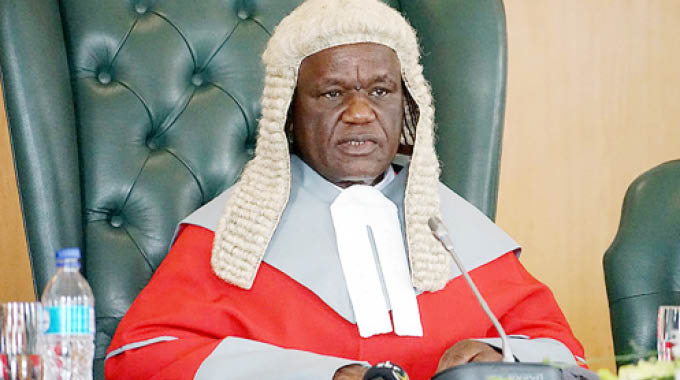
By Mercy Mungoriwo/Pavel Mwaoseni
Chief Justice Luke Malaba has called for government to review salaries and conditions of service for workers under the Judiciary Service Commission (JSC).
During his address while officially opening the 2022 judicial year Monday, Malaba said poor remuneration caused a high staff turnover that affected the JSC’s operations last year.
He also added that the adverse effects of the Covid-19 pandemic which saw drastic measures being implemented to curtail its spread worsened the hold-up.
“The JSC witnessed a high staff turnover in the year under review because of low salaries. During the year under review the JSC lost a total of 88 members of staff through resignations, of whom 18 were magistrates.…It is no exaggeration to say that justice suffers when judicial officers are underpaid.”
“In view of the economic environment that is prevailing in the country at the moment, workers in the public sector, including members of the Judicial Service, continue to experience financial hardships due to low remuneration levels. It is therefore important that the Government should constantly review the salaries of the workers so that they remain relevant to the prevailing economic situation,” he said.
On Covid-19, Malaba said the courts failed to run efficiently over a period of six months following national lockdowns imposed by the government that led to the closure of courts resulting in huge backlogs within the justice system.
He said the ripple effects of the pandemic taught the JSC that embracing of technology was critical rather than relying on use of the erstwhile traditional system which was a huge risk.
“The statistics on the performance of the courts show that the measures taken to prevent and contain the spread of the Covid-19 pandemic had a serious negative effect on the administration of justice during the year under review, as the efficiency of the courts was seriously undermined.
“The impact of the Covid–19 pandemic, though traumatic and harrowing in many respects, has revealed a certain truth about the use of technology.
“The Judiciary appears to have been slow in adopting electronic justice as it has found comfort in traditional ways of doing things…The Judiciary is doing this at its own peril, as the use of information communication technology has increasingly become the normal way of doing any business, including the business of delivering justice,” said Malaba.
Malaba said JSC has since started procuring equipment for its data centre which will house their Integrated Electronic Case Management System (IECMS) “expected to assist in the management of court backlogs and in decisively dealing with the vice of corruption, as it contains components such as automatic case allocation”.
Predicted to be launched on May 1 this year, the IECMS will integrate legal practitioners, the National Prosecuting Authority, the Office of the Attorney-General, the Zimbabwe Anti-Corruption Commission, the Zimbabwe Republic Police and the Zimbabwe Prisons and Correctional Service.
This year’s judicial year will be running under the theme “Use of technology to enhance efficiency and the rule of law in the Judiciary”. Nhau/Indaba
 Nhau News Online News that is accurate, reliable, trustworthy!!
Nhau News Online News that is accurate, reliable, trustworthy!!
